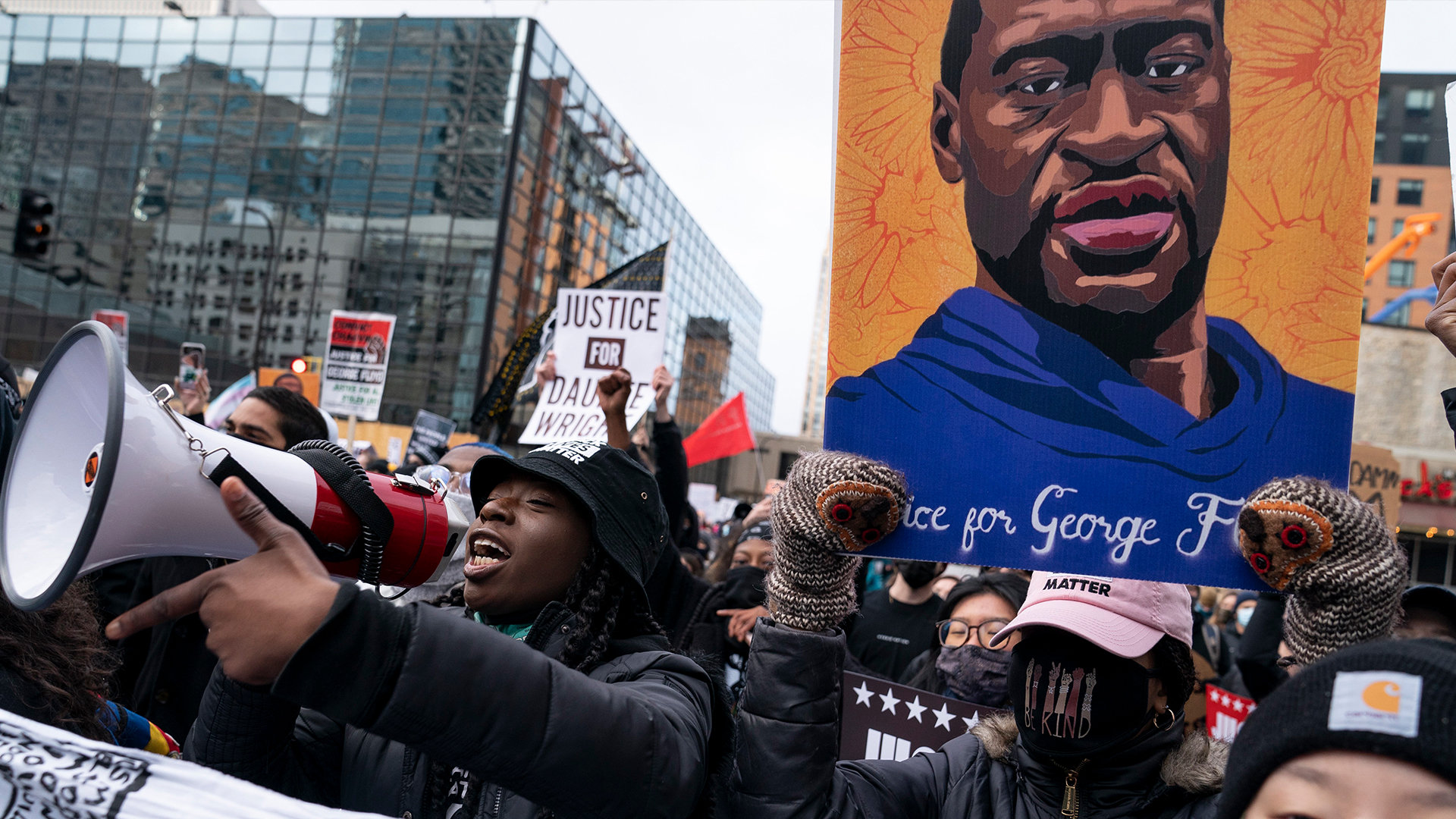![]()
On Tuesday, former Minneapolis police officer Derek Chauvin was convicted of murder and manslaughter for the death of George Floyd. The jury, consisting of five men and seven women, deliberated for four hours on Monday afternoon and resumed Tuesday morning. The jury was sequestered for its deliberation on those days.
Chauvin was convicted of second-degree murder charge for intentionally assaulting Floyd with his knee, third-degree murder charge for Chauvin’s “perpetrating an act eminently dangerous to others and evincing a depraved mind, without regard for human life” and second-degree manslaughter charge for Chauvin’s “culpable negligence” for Floyd’s death.
In May 2020, the killing of a 46-year-old Black man, George Floyd, triggered a cascade of worldwide protest over the racial and deadly oppression of Black Americans by the police. Video circulation of former officer Derek Chauvin’s placed knee on Floyd’s neck and back for nine minutes and 29 seconds rekindled the Black Lives Matter movement across the nation.
The prosecution opened the trial with a stark description of events that preceded and followed Floyd’s death, and rebutted the defense’s claim that fentanyl and methamphetamine contributed to his death.
“Mr. Derek Chauvin betrayed this badge when he used excessive and unreasonable force upon the body of Mr. George Floyd,” prosecuting attorney Jerry Blackwell said. “That he put his knees upon his neck and his back, grinding and crushing him until the very breath … until the very life was squeezed out of him.”
Eric Nelson, Chauvin’s defense attorney, argued it was “Floyd’s consumption of illegal drugs rather than” Chauvin’s actions and “unruly” nature of the crowd that escalated the events, according to The Associated Press. Nelson discussed the American ideal of “innocent before proven guilty” that is inherent in the Constitution. Nelson claimed that the prosecution would not be able to prove guilt beyond a reasonable doubt. “Compare the evidence against itself. Test it, challenge it,” Nelson said. “If the state is missing any one single element, it is not a guilty verdict.”
Chauvin, 46, had pleaded not guilty to second-degree unintentional murder, third-degree murder and second-degree manslaughter charges. Judge Peter Cahill rejected the defense’s request for an “immediate sequester,” of the jury on April 12 and acquittal of Chauvin for Floyd’s death on April 14 based on the conflicting opinions given by the prosecution’s expert witnesses. The jury began deliberation on April 19.
Miguel Rivera, adjunct professor at John Brown University and former Deputy Attorney for the State of Indiana, affirmed the “very strong … [and] fantastic job,” prosecution team did with their statements. “The way they have organized the order of witnesses and the times they have called and how they have questioned,” Rivera said during the trial.
Daniel Bennett, associate professor of political science, noted the closing arguments of the prosecution in their decision to finish with testimonies, medical experts and the timeline of events. “It’s been pretty harrowing so far,” he said.
The prosecution made their closing arguments on April 13; afterward, the defense received a chance to prove their points. Chauvin’s defense, as previously stated, tried to convince the jury the Floyd’s health issues contributed to his death and Chauvin’s actions were “justified,” as stated by Barry Brodd, a former police officer and use-of-force expert. Additionally, the defense brought up Dr. David Fowler, former chief medical examiner of Maryland, who claimed Floyd died of “cardiac arrhythmia.”
Regarding the defense’s strategy, Bennett commented it is the defense’s “best strategy … to create ‘reasonable doubt,’ about Mr. Chauvin’s culpability. That’s always a high bar for the prosecution to clear.”
Rivera called the defense’s argument that Floyd would have died anyway as “serendipitous,” and “makes no common sense.” He remarked that the drug use claim is a “double-edged sword,” because Floyd’s past drug record did not result in such an adverse reaction. In Rivera’s opinion, “The totality of their experience … common logic … combined with the medical experts’ opinions, it strains credulity to say the cause of death was [the heart condition and drugs].”
The prosecution countered the defense claims during their 11 days with expert witnesses like Dr. Andrew Baker, the Hennepin County medical examiner who cited and concluded homicide by the medical report from “complicating law enforcement subdual, restraint, and neck compression.” Forensic pathologist Dr. Lindsey Thomas testified “there was nothing sudden,” about Floyd’s death that would point to an overdose. “The primary death was asphyxia or low oxygen,” she said.
On day 14 of the trial, the day the defense gave its closing arguments, Chauvin exercised his Fifth Amendment right to not testify in the trial.
Tragically, a 20-year-old Black man, Daunte Wright, was pulled over for a traffic violation, struggled with officers and killed on April 11. This happened 10 miles away from where Floyd was killed by Chauvin in Minneapolis. Despite Minnesota Gov. Tim Waltz’s 7 p.m. curfew, protesters demonstrated against the Brooklyn Center riot police force.
The BBC reported that 20 businesses were broken into and sporadically looted. Police deployed tear gas and stun grenades to disperse protesters, and members of the Minnesota National Guard were deployed for the Chauvin trial. National ice hockey, basketball and baseball were postponed until further notice.
On April 17, Rep. Maxine Waters made a call for protestors to “stay on the street” and “get more confrontational” if Chauvin was acquitted in Floyd’s killing. Nelson described these comments as “threats” and references in the media against the sanctity of the jury.
“I’ll give you that Congresswoman Waters may have given you something on appeal that may result in this whole trial being overturned,” Cahill said.
Upon hearing Chauvin was convicted on all three charges, people outside the court room erupted into tears of joy and celebration as the verdict was announced for the public.
Former president Barack Obama tweeted his support for the jury’s decision in the case. “While today’s verdict may have been a necessary step on the road to progress,” he said, “it is far from a sufficient one.” He advocated for police reform and to “redouble efforts to expand economic opportunity,” for marginalized communities.
Japanese professional tennis player Naomi Osaka tweeted out her sadness for the celebration of this event as the judgment was “clear as day.” “The fact that so many injustices occurred to make us hold our breath toward this outcome is really telling,” she said.
President Joe Biden and Vice President Kamala Harris addressed the nation following the jury’s decision.
Harris stated that “the racial injustice that we have fought for generations … it is not just a Black American problem … it is a problem for every American.”
Biden told the nation “this verdict is a step forward” but more action is required to properly advance the nation. He called Congress to action for the George Floyd Police Reform Bill as vital reformation to hold police accountable for their actions. “We can and we must reduce the possibilities of tragedies like this again,” he said. Moreover, Biden highlighted how this decision came almost “a whole year” after Floyd’s death just to get to this point.
Photo courtesy of The Wall Street Journal





